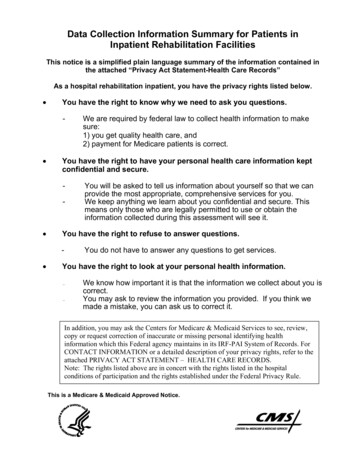
Transcription
Data Collection Information Summary for Patients inInpatient Rehabilitation FacilitiesThis notice is a simplified plain language summary of the information contained inthe attached “Privacy Act Statement-Health Care Records”As a hospital rehabilitation inpatient, you have the privacy rights listed below. You have the right to know why we need to ask you questions.- You have the right to have your personal health care information keptconfidential and secure.- You will be asked to tell us information about yourself so that we canprovide the most appropriate, comprehensive services for you.We keep anything we learn about you confidential and secure. Thismeans only those who are legally permitted to use or obtain theinformation collected during this assessment will see it.You have the right to refuse to answer questions.- We are required by federal law to collect health information to makesure:1) you get quality health care, and2) payment for Medicare patients is correct.You do not have to answer any questions to get services.You have the right to look at your personal health information.——We know how important it is that the information we collect about you iscorrect.You may ask to review the information you provided. If you think wemade a mistake, you can ask us to correct it.In addition, you may ask the Centers for Medicare & Medicaid Services to see, review,copy or request correction of inaccurate or missing personal identifying healthinformation which this Federal agency maintains in its IRF-PAI System of Records. ForCONTACT INFORMATION or a detailed description of your privacy rights, refer to theattached PRIVACY ACT STATEMENT – HEALTH CARE RECORDS.Note: The rights listed above are in concert with the rights listed in the hospitalconditions of participation and the rights established under the Federal Privacy Rule.This is a Medicare & Medicaid Approved Notice.
PRIVACY ACT STATEMENT - HEALTH CARE RECORDSThis statement gives you notice required by law (the Privacy Act of 1974).This statement is not a consent form. It will not be used to release or to use yourhealth care information.I. Authority for collection of your information, including your social securitynumber, and whether or not you are required to provide information for thisassessment. Sections 1102(a), 1154, 1861(z), 1864, 1865, 1866, 1871, 1886(j) of theSocial Security Act.Medicare participating inpatient rehabilitation facilities must do a complete assessmentthat accurately reflects your current clinical status and includes information that can beused to show your progress toward your rehabilitation goals. The inpatient rehabilitationfacility must use the Inpatient Rehabilitation Facility-Patient Assessment Instrument(IFR-PAI) as part of that assessment, when evaluating your clinical status. The IRF-PAImust be used to assess every Medicare Part A fee-for-service inpatient, and it may beused to assess other types of inpatients. This information will be used by the Centers forMedicare & Medicaid Services (CMS) to be sure that the inpatient rehabilitation facilityis paid appropriately for the services that they furnish you, and to help evaluate that theinpatient rehabilitation facility meets quality standards and gives appropriate health careto its patients. You have the right to refuse to provide information to the inpatientrehabilitation facility for the assessment. Information provided to the federal governmentfor this assessment is protected under the Federal Privacy Act of 1974 and the IRF-PAISystem of Records. You have the right to see, copy, review, and request correction ofinaccurate or missing personal health information in the IRF-PAI System of Records.II. PRINCIPAL PURPOSES FOR WHICH YOUR INFORMATION ISINTENDED TO BE USEDThe information collected will be entered into the IRF-PAI System No. 09-70-1518. Yourhealth care information in the IRF-PAI System of Records will be used for the followingpurposes: support the IRF prospective payment system (PPS) for payment of the IRF MedicarePart A fee-for-services furnished by the IRF to Medicare beneficiaries; help validate and refine the Medicare IRF-PPS study and help ensure the quality of care provided by IRFs; enable CMS and its agents to provide IRFs with data for their quality assurance andultimately quality improvement activities; support agencies of the State government , deeming organizations or accreditingagencies to determine, evaluate and assess overall effectiveness and quality of IRFservices provided in the State; provide information to consumers to allow them to make better informed selections ofproviders; support regulatory and policy functions performed within the IRF or by a contractor orconsultant;1
support constituent requests made to a Congressional representative; support litigation involving the facility; support research on the utilization and quality of inpatient rehabilitation services; aswell as, evaluation, or epidemiological projects related to the prevention of disease ordisability, or the restoration or maintenance of health for understanding and improvingpayment systems.III. ROUTINE USESThese “routine uses” specify the circumstances when the Centers for Medicare &Medicaid Services may release your information from the IRF-PAI System of Recordswithout your consent. Each prospective recipient must agree in writing to ensure thecontinuing confidentiality and security of your information. Disclosures of protectedhealth information authorized by these routine uses may be made only if, and as,permitted or required by the ‘Standards for Privacy of Individually Identifiable HealthInformation.’ (45 CFR Parts 160 and 164). Disclosures of the information may be to:1. To agency contractors or consultants who have been contracted by the agency toassist in the performance of a service related to this system of records and whoneed to have access to the records in order to perform the activity;2. To a Peer Review Organization (PRO) in order to assist the PRO to perform TitleXI and Title XVIII functions relating to assessing and improving IRF quality ofcare. PROs will work with IRFs to implement quality improvement programs,provide consultation to CMS, its contractors, and to State agencies;3. To another Federal or State agency:a. To contribute to the accuracy of CMS’s proper payment of Medicarebenefits,b. To enable such agency to administer a Federal health benefits program, oras necessary to enable such agency to fulfill a requirement of a Federalstatute or regulation that implements a health benefits program funded inwhole or in part with Federal funds, orc. To improve the state survey process for investigation of complains relatedto health and safety or quality of care and to implement a more outcomeoriented survey and certification program.4. To an individual or organization for a research, evaluation, or epidemiologicalprojects related to the prevention of disease or disability, the restoration ormaintenance of health epidemiological or for understanding and improvingpayment projects.5. To a member of Congress or to a congressional staff member in response to ainquiry of the Congressional Office made at the written request of the constituentabout whom the record is maintained.6. To the Department of Justice (DOJ), court or adjudicatory body when:a. The agency or any component thereof; orb. Any employee of the agency in his or her official capacity; orc. Any employee of the agency in his or her individual capacity where theemployee; or2
7.8.9.10.d. The United States Government; is a party to litigation or has an interest insuch litigation, and by careful review, CMS determines that the recordsare both relevant and necessary to the litigation and the use of suchrecords by the DOJ, court or adjudicatory body is compatible with thepurpose for which the agency collected the records.To a CMS contractor (including, but not necessarily limited to fiscalintermediaries and carriers) that assists in the administration of a CMSadministered health benefits program, or to a grantee of a CMS-administeredgrant program, when disclosure is deemed reasonably necessary by CMS toprevent, deter, discover, detect, investigate, examine, prosecute, sue with respectto, defend against, correct, remedy, or otherwise combat fraud or abuse in suchprogram.To another Federal agency or to an instrumentality of any governmentaljurisdiction within or under the control of the United States (including any Stateor local governmental agency), that administers, or that has the authority toinvestigate potential fraud or abuse in whole or part by Federal funds, whendisclosure is deemed reasonable necessary by CMS to prevent, deter, discover,detect, investigate, examine, prosecute, sue with respect to, defend against,correct, remedy, or otherwise combat frauds or abuse in such programs;To a national accrediting organization that has been approved for deemingauthority for Medicare requirements for inpatient rehabilitation services (i.e., theJoint Commission for the Accreditation of Healthcare Organizations, theAmerican Osteopathic Association and the Commission of Accreditation ofRehabilitation Facilities). Data will be released to these organizations only forthose facilities that participate in Medicare by virtue of their accreditation status.To insurance companies, third party administrators (TPA), employers, selfinsurers, manage care organizations, other supplemental insurers, noncoordinating insurers, multiple employer trusts, group health plans (i.e., healthmaintenance organizations (HMO) or a competitive medical plan (CMP)) with aMedicare contract, or a Medicare-approved health care prepayment plan (HCPP),directly or through a contractor, and other groups providing protection for theirenrollees. Information to be disclosed shall be limited to Medicare entitlementdata. In order to receive the information, they must agree to:a. Certify that the individual about whom the information is being providedis one of its insured or employees, or is insured and/or employed byanother entity for whom they serve as a third party administrator;b. Utilize the information solely for the purpose of processing theindividual’s insurance claims; andc. Safeguard the confidentiality of the data and prevent unauthorized access.IV. EFFECT ON YOU IF YOU DO NOT PROVIDE INFORMATIONThe inpatient rehabilitation facility needs the information contained in the IRF-PAI inorder to comply with the Medicare regulations. Your inpatient rehabilitation facility willalso use the IRF-PAI to assist in providing you with quality care. It is important that theinformation be correct. Incorrect information could result in payment errors. Incorrect3
information also could make it difficult to evaluate if the facility is giving you qualityservices. If you choose not to provide information, there is no federal requirement for theinpatient rehabilitation facility to refuse you services.CONTACT INFORMATIONIf you want to ask the Centers for Medicare & Medicaid Services to see, review, copy orrequest correction of inaccurate or missing personal health information which thatFederal agency maintains in its IRF-PAI System of Records:Call 1-800-MEDICARE, toll free, for assistance in contacting the IRF-PAI System ofRecords Manager.TTY for the hearing and speech impaired: 1-800-820-1202This is a Medicare & Medicaid Approved Notice.4
THE RUSK INSTITUTE OF REHABILITATION MEDICINEMEDICALLY COMPLEX REHABILITATION PROGRAMThe Rusk Institute of Rehabilitation Medicine offers a specialized rehabilitation program targeted to the needs of patientswho have a variety of medically complex conditions. Some examples of these conditions include non-traumatic ortraumatic spinal cord injury, myopathy and polyneuropathy (CIDP, critical illness, toxic, alcohol, idiopathic, hereditary andGuillain-Barre), post-organ transplantation, Parkinson’s Disease, Multiple Sclerosis, amputations, pain syndromes,arthritic conditions, congenital disorders, balance and coordination problems and other general and medically complexdebilitating conditions.The many and complex requirements of this patient population necessitate a devoted rehabilitation team with a wealth ofclinical knowledge and experience. The Rehabilitation Program at the Rusk Institute offers comprehensive care by a teamof specialists who provide integrated treatment for this unique population. We admit adult patients 18 years and over.Treatment will include: Medical care Rehabilitation nursing care andeducation Wound care by a specializedwound care team Nutrition education and counseling Psychological support andcounseling Cognitive therapy (if indicated)Discharge planningPhysical therapy to improve rangeof motion, strength, balance andmobilityOccupational therapy to improveactivities of daily living Speech therapySwallowing therapy (if indicated)Vocational counseling (if indicated)Recreation TherapistIf Driver Education is recommended,a referral to programs at otherfacilities will be provided.REHABILITATION TEAMFrom the moment of arrival, you and your family and /or significant others become a part of the team and remain essentialmembers of the team throughout the rehabilitation process. Your physiatrist (a physician specializing in rehabilitationmedicine) will be the team leader responsible for your medical care and the coordination of your rehabilitation treatmentprogram. Other team members include: Rehabilitation NursesNutritionistPhysical Therapists andAssistantsOccupational Therapists andAssistants PsychologistsSpeech-Language PathologistsSocial WorkersRecreation TherapistSocial Workers Recreational TherapistVocational CounselorsSwallowing SpecialistsHorticultural TherapistsPatients will be evaluated for: Medical acuity – patients must be medically stable (i.e., not requiring the level of medical/surgical services than anacute care hospital would provide), and not require ventilator support or have acute psychiatric disorders. Psychological status – patients must be alert and well-oriented so that they are able to follow simple verbal, tactileor gestural directions. Behavioral status – patients must be cooperative and not agitated or combative. Intended discharge environments – It is expected that patients will be discharged home with services or to asubacute rehabilitation facility.REHABILITATION PROGRAMTherapy will be provided individual or group sessions six days per week. Your program will include: Physical Therapy and Occupational Therapy (a minimum of 3 hours per day) Psychology evaluation and treatment sessions (1/2 – 1 hour) Speech/Language Pathology (1/2 – 1 hour, if indicated) Horticultural Therapy (1/2 – 1 hour, if indicated) Other specialists (if included)Individualized PT and OT treatments are also scheduled on Saturdays to continue the course toward maximizing yourrecovery and your ability to perform daily activities.The rehabilitation nursing staff will work with you to reinforce the functional skills you have achieved in therapy. Thenursing staff will also provide you and your family and/or significant other with information regarding your care inpreparation for discharge, including information on your medications. Social workers and therapists also provideeducational sessions. Your social worker will meet with you and help guide you through the rehabilitation process. Thelength of stay varies depending on the medical and rehabilitation needs of each patient. Your physiatrist, social worker,and rehab team will keep you up-to-date with discharge information.
THE JOAN AND JOEL SMILOWCARDIAC REHABILITATION AND PREVENTION CENTEROF THE RUSK INSTITUTE OF REHABILITATION MEDICINEWHAT SERVICES ARE PROVIDED AT THE RUSK INSTITUTE FOR PEOPLE WHO REQUIRE CARDIACREHABILITATION?The Cardiac Rehabilitation Program at the Rusk Institute offers comprehensive care by a team of specialistswho provide integrated treatment for people with cardiac disabilities. We admit adult patients 18 years and over.Treatment will include: Medical Care Rehabilitation nursing care and education Telemetric monitored progressive aerobicexercises and strength training Activities of daily living Psychiatric and Psychological support andcounselingCoronary risk factor modification services:(weight management, diabetic self-care, lipidmanagement)REHABILITATION TEAMFrom the moment of arrival, you and your family and/or significant others become a part of the team and remainessential members during the rehabilitation process. Your Physiatrist (physician specializing in rehabilitationmedicine), will be the team leader responsible for your medical care and the coordination of your rehabilitationtreatment program.Other team members include: Cardiologist\Rehabilitation Nurses Nutritionist Advance Practice Nurses Exercise Physiologists Rehabilitation nursing care and education Physical Therapists PsychiatristsPsychologistsSocial WorkersRecreation TherapistsVocational CounselorsHorticultural TherapistsREHABILITATION PROGRAMTherapy will be provided in individual or group sessions six days per week. Your regular program will include: Physical Therapy and Occupational Therapy(Individual and Group sessions)Telemetric monitored strengthening andendurance exercisesHorticultural TherapyEducation programs with Nursing, Nutrition,Psychology and Social Work Psychology evaluations and treatment sessionsas recommended by PhysiatristIndividualized treatments are scheduled onthe weekends to continue he course towardmaximizing your recovery and your ability toperform daily activities.Patients will be evaluated for: Medical acuity – patients must be medically stable (i.e., not requiring the level of medical/surgical servicesthan an acute care hospital would provide), and not require ventilator support or have acute psychiatricdisorders. Psychological status – patients must be alert and well-oriented so that they are able to follow simple verbal,tactile or gestural directions. Behavioral status – patients must be cooperative and not agitated or combative. Intended discharge environments – It is expected that patients will be discharged home with services or to asubacute rehabilitation facility.The rehabilitation nursing staff will work with you to reinforce the skills you have achieved in therapy. Thenursing staff will provide you and your family and/or significant others with information regarding your care,including information on your medications, in preparation for discharge. Your social worker will meet with youand help guide you through the rehabilitation process.AVERAGE LENGTH OF STAY AT THE RUSK INSTITUE FOR PATIENTS IN CARDIAC REHABILITATIONThe length of stay varies depending on the medical and rehabilitation needs of each patient. Your physiatristand the rehab team will keep you up-to-date with discharge information. Most patients admitted to CardiacRehabilitation complete their inpatient stay within one to two weeks.
THE RUSK INSTITUTE OF REHABILITATION MEDICINEMUSCULOSKELETAL REHABILITATION PROGRAMThe Rusk Institute of Rehabilitation Medicine offers a specialized rehabilitation program targeted to the needs of patientswho have a variety of musculoskeletal conditions. Some examples of these conditions include total hip or kneereplacements, hip fractures or other orthopedic problemsThe many and complex requirements of this patient population necessitate a devoted rehabilitation team with a wealth ofclinical knowledge and experience. The Rehabilitation Program at the Rusk Institute offers comprehensive care by a teamof specialists who provide integrated treatment for this unique population. We admit adult patients 18 years and over.Treatment will include: Medical care Rehabilitation nursing care andeducation Wound care by a specializedwound care team Nutrition education and counseling Psychological support andcounseling Cognitive therapy (if indicated)Discharge planningPhysical therapy to improve rangeof motion, strength, and mobilityOccupational therapy to improveactivities of daily livingSpeech therapySwallowing therapy (if indicated) Vocational counseling(if indicated)Recreation TherapistIf Driver Education isrecommended, a referral toprograms at other facilities willbe provided.REHABILITATION TEAMFrom the moment of arrival, you and your family and /or significant others become a part of the team and remain essentialmembers of the team throughout the rehabilitation process. Your physiatrist (a physician specializing in rehabilitationmedicine) will be the team leader responsible for your medical care and the coordination of your rehabilitation treatmentprogram. Other team members include: Rehabilitation NursesNutritionistPhysical Therapists andAssistantsOccupational Therapistsand Assistants PsychologistsSpeech-Language PathologistsSocial WorkersRecreation Therapist Vocational CounselorsSwallowing SpecialistsHorticultural TherapistsPatients will be evaluated for: Medical acuity – patients must be medically stable (i.e., not requiring the level of medical/surgical services than anacute care hospital would provide), and not require ventilator support or have acute psychiatric disorders. Psychological status – patients must be alert and well-oriented so that they are able to follow simple verbal, tactileor gestural directions. Behavioral status – patients must be cooperative and not agitated or combative. Intended discharge environments – It is expected that patients will be discharged home with services or to asubacute rehabilitation facility.REHABILITATION PROGRAMTherapy will be provided in individual or group sessions six days per week. Your program will include: Physical Therapy and Occupational Therapy (a minimum of 3 hours per day) Psychology evaluation and treatment sessions (1/2 – 1 hour) Speech/Language Pathology (1/2 – 1 hour, if indicated) Horticultural Therapy (1/2 – 1 hour, if indicated) Other specialists (if included)Individualized PT and OT treatments are also scheduled on Saturdays to continue the course toward maximizing yourrecovery and your ability to perform daily activities.The rehabilitation nursing staff will work with you to reinforce the functional skills you have achieved in therapy. Thenursing staff will also provide you and your family and/or significant other with information regarding your care inpreparation for discharge, including information on your medications. Social workers and therapists also provideeducational sessions. Your social worker will meet with you and help guide you through the rehabilitation process. Thelength of stay varies depending on the medical and rehabilitation needs of each patient. Your physiatrist, social worker,and rehab team will keep you up-to-date with discharge information
THE RUSK INSTITUTE OF REHABILITATION MEDICINEPEDIATRIC REHABILITATION PROGRAMThe Rusk Institute of Rehabilitation Medicine offers a specialized rehabilitation program targeted to the needs of pediatricand adolescent patients who have a variety of conditions requiring acute rehabilitation.The Pediatric Rehabilitation Program at the Rusk Institute offers comprehensive care by a team of specialists who provideintegrated treatment for children/adolescents. We admit patients 18 months to 18 years of age, or to 21 years of age asdevelopmentally appropriate.Treatment will include: Medical care Rehabilitation nursing care andeducation Developmental exercises and gaittraining Muscle re-education andstrengthening Nutrition education andcounseling Psychological support andcounselingCognitive therapy (if indicated)Discharge planningPhysical therapy to improverange of motion, strength, andmobilityOccupational therapy to improveactivities of daily living Speech therapySwallowing therapy(if indicated)Vocational counseling(if indicated)Recreation TherapistLeisure/plan activitiesEducational ServicesREHABILITATION TEAMFrom the moment of arrival, the child/adolescent and the family become a part of the team and remain at the center of theteam during the rehabilitation process. Your physiatrist (a physician specializing in rehabilitation medicine) will be theteam leader responsible for your medical care and the coordination of your rehabilitation treatment program.Other team members include: Rehabilitation Nurses Nutritionist Physical Therapists andAssistants Occupational Therapistsand Assistants PsychologistsSpeech-Language PathologistsSocial WorkersTeachersRecreation TherapistVocational Counselors Swallowing SpecialistsHorticultural TherapistsPediatric sub-specialtyconsultants (as clinicallyindicated)Patients will be evaluated for: Medical acuity – patients must be medically stable (i.e., not requiring the level of medical/surgical services than anacute care hospital would provide), and not require ventilator support or have acute psychiatric disorders. Psychological status – patients must be alert and well-oriented so that they are able to follow simple verbal, tactileor gestural directions. Behavioral status – patients must be cooperative and not agitated or combative. Intended discharge environments – It is expected that patients will be discharged home with services or to asubacute rehabilitation facility.REHABILITATION PROGRAMTherapy will be provided in individual or group sessions six days per week. Your program will include: Physical Therapy and Occupational Therapy (a minimum of 3 hours per day) Psychology evaluation and treatment sessions (1/2 – 1 hour, if indicated) Speech/Language Pathology (1/2 – 1 hour, if indicated) Horticultural Therapy (1/2 – 1 hour, if indicated) Educational Services coordinated through the NYC Department of Education Other specialists (if included)Individualized PT and OT treatments are also scheduled on Saturdays to continue the course toward maximizing yourrecovery and your ability to perform daily activities.The rehabilitation nursing staff will work with the child/adolescent to reinforce the functional skills you have achieved intherapy. The nursing staff will also provide the child/adolescent and the family with information concerning health care,including information about the medications prescribed by the physiatrist. Social workers and therapists also provideeducational sessions. Your social worker will meet with the child/adolescent and family members to help guide youthrough the rehabilitation process. The length of stay varies depending on the medical and rehabilitation needs of eachpatient. Your physiatrist, social worker, and rehab team will keep you up-to-date with discharge information.
THE RUSK INSTITUTE OF REHABILITATION MEDICINESTROKE and BRAIN INJURY REHABILITATION PROGRAMThe Rusk Institute of Rehabilitation Medicine offers a specialized rehabilitation program targeted to the needs of patientswho have had a stroke or brain injury. As part of NYU Hospital Center’s Stroke and Brain Injury Center of Excellence, theRusk team, as part of the continuum of care, provides all the appropriate rehabilitation needs to this patient population. Asnecessary, other neurological conditions can also be treated on this unit. Some examples of these conditions include nontraumatic or traumatic brain injury, encephalopathy, encephalitis, meningitis, and hydrocephalus (NPH), with or without VPshunt.The Rehabilitation Program at the Rusk Institute offers comprehensive care by a team of specialists who provideintegrated treatment for problems associated with neurological conditions. We admit adult patients 18 years and over.Treatment will include: Medical care Rehabilitation nursing care andeducation Muscle re-education andstrengthening Psychological support andcounseling Cognitive therapy (if indicated) Discharge planningPhysical therapy to improve rangeof motion, strength, and mobilityOccupational therapy to improveactivities of daily livingSpeech therapySwallowing therapy (if indicated) Vocational counseling(if indicated)Recreation TherapistIf Driver Education isrecommended, a referral toprograms at other facilities willbe provided.REHABILITATION TEAMFrom the moment of arrival, you and your family and /or significant others become a part of the team and remain essentialmembers of the team throughout the rehabilitation process. Your physiatrist (a physician specializing in rehabilitationmedicine) will be the team leader responsible for your medical care and the coordination of your rehabilitation treatmentprogram. Other team members include: Rehabilitation NursesNutritionistPhysical Therapists andAssistantsOccupational Therapistsand Assistants PsychologistsSpeech-Language PathologistsSocial WorkersRecreation Therapist Vocational CounselorsSwallowing SpecialistsHorticultural TherapistsPatients will be evaluated for: Medical acuity – patients must be medically stable (i.e., not requiring the level of medical/surgical services than anacute care hospital would provide), and not require ventilator support or have acute psychiatric disorders. Psychological status – patients must be alert and well-oriented so that they are able to follow simple verbal, tactileor gestural directions. Behavioral status – patients must be cooperative and not agitated or combative. Intended discharge environments – It is expected that patients will be discharged home with services or to asubacute rehabilitation facility.REHABILITATION PROGRAMTherapy will be provided in individual or group sessions six days per week. Your program will include: Physical Therapy and Occupational Therapy (a minimum of 3 hours per day) Psychology evaluation and treatment sessions (1/2 – 1 hour) Speech/Language Pathology (1/2 – 1 hour, if indicated) Horticultural Therapy (1/2 – 1 hour, if indicated) Other specialists (if included)Individualized PT and OT treatments are also scheduled on Saturdays to continue the course toward maximizing yourrecovery and your ability to perform daily activities.The reha
used to show your progress toward your rehabilitation goals. The inpatient rehabilitation facility must use the Inpatient Rehabilitation Facility-Patient Assessment Instrument (IFR-PAI) as part of that assessment, when evaluating your clinical status. The IRF-PAI must be used to assess every Medicare Part A fee-for-service inpatient, and it may be











